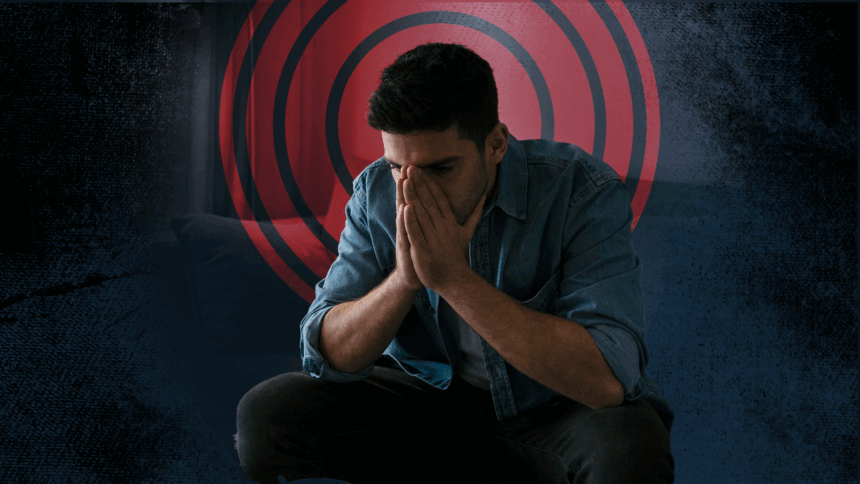Behind simple phrases like “Lalaki ka kasi” lies a culture that glorifies toughness, and unrecognizes the importance of mental health.
Across the Philippines, countless boys are raised with the notion that showing emotions is a sign of weakness, that crying is shameful, and that mental distress is something that may be ignored until it goes away.
However, it persists. It is buried. Buried pains might also come to the surface in other ways, such as anger, addiction, or suicide.
Never talked about
Mental health has long been a sensitive subject in Filipino society. But for men, the stigma is even more intense. According to the Philippine Statistics Authority, 12.5 million Filipinos suffer from mental health problems, and out of 100,000 Filipinos, 13.7% are men and 7.2% are women, 6.5% higher than women.
This is an indication of a bigger issue, not just a statistic.
According to a survey conducted by Priory Group, work-related stress, financial pressures, and health concerns are mainly the causes of their mental health problem, and 40% of men never talked about their mental health struggles to anyone, and 20% of them believed there is a negative stigma about it.
Because from a young age, men are taught to “man up” and “just deal with it”. Drama is used to dismiss emotional suffering. Depression is spiritualized. People view anxiety as a symptom of indolence. And so, many men turn into outlets: drinking, smoking, gambling, violence, or simply retreating from the world altogether.
The message is clear: you’re allowed to break down, but in silence.
Cultural weight of “barako” masculinity
In Filipino culture, “barako” is often described as stoic, hardworking, and dominant—deeply embedded in families, media, and social norms. It celebrates resilience but leaves no room for softness. As a result, when men feel overwhelmed, they rarely feel enough to say so.
These pressures are especially heavy on younger men. Mental health issues are frequently written off in homes and schools as mood swings or teenage rebellion. Burnout in the workplace is cast aside. In the workplace, burnout is brushed aside. In communities, emotional distress is often dealt with privately–if at all.
The result is men suffer in silence, often without even realizing that what they are experiencing is treatable.
The quiet shift
The silence continues to be broken in spite of these obstacles.
With a focus on the rights of those who use psychiatric, neurologic, and psychosocial health services, Republic Act No. 11036, often known as the Mental Health Act, seeks to offer the general public with high-quality, affordable, and culturally relevant mental health care. This act, which was amended in 2018, also calls on the local government, the educational system, and companies to offer mental health services in an effort to lessen the stigma linked to mental health issues.
University-based programs and mental health organizations like #MentalHealthPH, Mind You Philippines, and HOPELINE are opening the doors for open, stigma-free discussions about mental health, particularly among males.
Some schools have begun integrating mental health seminars into their student life programs. Local youth councils have started “Kumustahan” sessions–an informal check-ins designed to help boys and young men talk about stress, pressure, and emotional pain without judgement.
Even on social media platforms, online creators–many of whom are men—are speaking up about their personal struggles. Whether its through vlogs, podcast, or TikTok, they are changing what masculinity can look like: vulnerable, emotional, and real.
Community solutions
Professional mental health services are still inaccessible for many—especially in rural areas. But communities are beginning to show that healing doesn’t have to wait for a psychiatrist.
Quezon City Community-based Mental Health Program (CBMHP) integrates mental health services, prevention, and treatment, and promotion of mental wellness in the community. Meanwhile, Calabarzon Community Mental Health Program (CMHP) piloted its implementation in four sites of the provinces of Rizal and Laguna, offering valuable lessons for designing community-based mental health problems. Both initiatives that focus on psychoeducation, skills building, and empowering health workers to address mental health issues at the community level.
These acts matter. They prove that support does not always come from institutions. Sometimes it comes from a friend who asks, “Kumusta ka na talaga?”
Still a gap
Despite this progress, significant challenges remain as stigma is still prevalent that prevents men from speaking up.
The lack of access to affordable and culturally sensitive mental health care is a barrier that many underserved areas suffer from.
“Men are told that we’re supposed to deal with our issues and keep them internalized. We’re told that talking about how you’re feeling is more of a feminine trait,” psychologist Adam Borland, PsyD, said.
The cultural expectations that continue to glorify endurance over emotional honesty, and mental health education in schools is optional.
“They [men] are subjected to a culture where the standards of masculinity are literally killing them,” said Benita Chatmon, PhD.
If left unaddressed, these gaps will continue to cost lives—not just through suicide, but through the erosion of well-being, productivity, and human connection.
New definition of “Strength”
We need a new kind of masculinity. One that doesn’t punish emotion, but honors it. One doesn’t equate vulnerability with weakness, but with courage.
“Pretending our issues don’t exist is unhealthy…It takes real strength and courage to look in the mirror and say, I’m dealing with some issues, and I want to figure them out,” Borland stressed.
Because the real strength is found in facing pain—not in hiding from it. Real manhood is not about holding everything in but about knowing when to let it out.
What can we do?
You can help shift the narrative regardless of your profession. You can start the conversation, normalize therapy and support groups; and support policies and programs, or just be listening ear without judgement.
Cleveland Clinic suggests reaching out to people suffering with mental health issues and be one of their support systems—befriend them, hang out together, and make them feel comfortable.
The next time a boy begins to cry, instead of saying, “Lalaki ka kasi”, let us say: “Oo, lalaki siya. Kaya may karapatan siyang masaktan at may karapatan din siyang gumaling.”
The silence is cracking. Let’s keep going—until every man knows that men don’t have to carry his pain alone.








